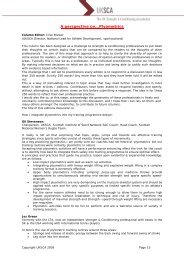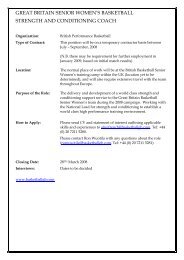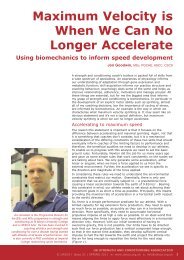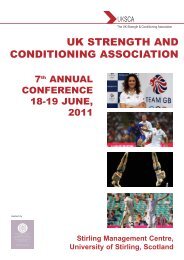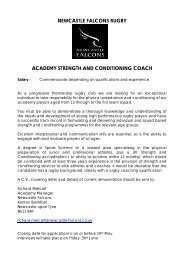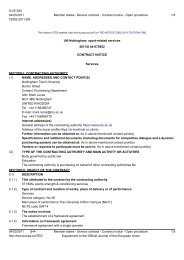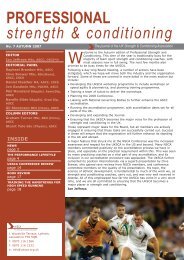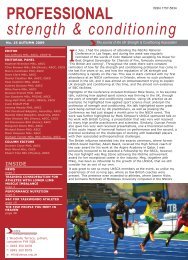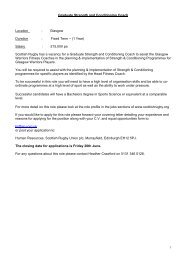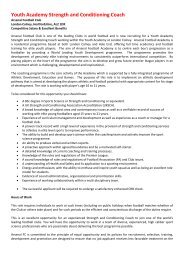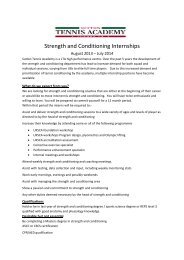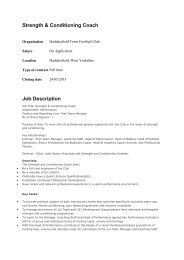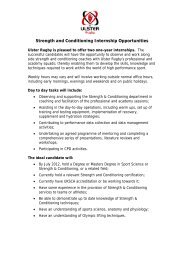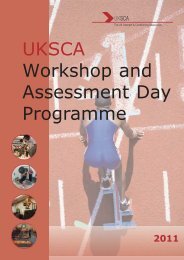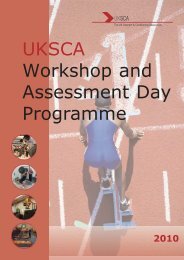uksca news june 2010.qxp
uksca news june 2010.qxp
uksca news june 2010.qxp
Create successful ePaper yourself
Turn your PDF publications into a flip-book with our unique Google optimized e-Paper software.
The Five Minds of the<br />
Modern Strength and<br />
Conditioning Coach<br />
Ian Jeffreys, PhD, FNSCA, ASCC, CSCS*D, NSCA-CPT,*D<br />
Ian Jeffreys is a senior lecturer in<br />
strength and conditioning at the<br />
University of Glamorgan. He is also<br />
the Proprietor and Performance<br />
Director of All-Pro Performance in<br />
Brecon Wales.<br />
A registered Strength and<br />
Conditioning Coach with the British<br />
Olympic Association, an NSCA<br />
Coach Practitioner, and a Board<br />
Member of the United Kingdom<br />
Strength and Conditioning<br />
Association, Ian was voted the<br />
NSCA High School Professional of<br />
the Year in 2006.<br />
One of the key decisions made at the development of the UKSCA’s<br />
accreditation process was the title of the accredited status the qualification<br />
afforded its members. The letters ASCC, Accredited Strength and<br />
Conditioning Coach, emphasise the role of the coaching process in the<br />
direct delivery of strength and conditioning. This is in contrast to other<br />
accreditations such as the CSCS where the role is seen as a strength and<br />
conditioning specialist, emphasising a person who possesses a body of<br />
strength and conditioning knowledge and not necessarily emphasising the<br />
application skills. While at first appearing nothing more than a semantic<br />
difference, it represents an important shift in emphasis from knowledge,<br />
towards the application of knowledge, and the importance of the entire<br />
coaching process to the effective delivery of strength and conditioning.<br />
This necessarily requires the development of skills associated with the<br />
coaching process, in addition to developing an appropriate body of<br />
knowledge. However, this trend is not seen in the strength and<br />
conditioning literature. So, while practices and methods are frequently<br />
discussed and researched, the coaching process is largely overlooked. In<br />
reality, it may be impossible to differentiate the means and methods<br />
utilised from the way in which they are delivered. The coaching process<br />
will have an important impact on the delivery of strength and conditioning,<br />
as well as on the way in which it is perceived and received by the athlete.<br />
Indeed, it is highly likely that this coach/athlete interaction will affect the<br />
productivity of any training programme. This necessitates a closer<br />
examination on the types of skills and traits that contribute to effective<br />
coaching in a strength and conditioning setting.<br />
It is therefore important to ascertain what makes an effective coach in the<br />
strength and conditioning environment. Is it simply the degree of<br />
specialised knowledge, the extent of teaching skills, or a complex mix of a<br />
wide range of factors, encompassing a wide range of competencies?<br />
Eminent Harvard Professor of Cognition and Education, Howard Gardner, in<br />
his book Five Minds for the Future, 5 outlines five key areas of intelligence<br />
that, he claims, will affect the capacity of individuals to achieve consistent<br />
success in a range of professions. He asserts that these five minds are at<br />
a premium in today’s world, and suggests that their importance will<br />
increase into the future.<br />
This article aims to extrapolate these 5 minds to the profession of strength<br />
and conditioning coaching, and to identify how these minds could impact<br />
upon coaching effectiveness. These can potentially provide a framework<br />
through which coaches can assess their own effectiveness, and which, in<br />
turn, can lead to targeted planning of professional development. Given the<br />
lack of empirical research in this area within the strength and conditioning<br />
profession, the article will, by necessity, attempt to synthesise information<br />
from a range of sources, and suggest their application to the strength and<br />
conditioning field. The aim is to produce an article that will generate<br />
discussion, while at the same time attempting to produce a multidimensional<br />
view of the profession, from which coaching effectiveness can<br />
be evaluated, possibly generating new approaches and solutions.<br />
What is Coaching?<br />
Prior to discussing the 5 minds of the effective coach, it is i mperative<br />
that the role of the coach be closely examined. However, little literature<br />
exists which examines coaching in a strength and conditioning context.<br />
This necessitates an examination of coaching in general, and requires<br />
the extrapolation of this information to the strength and conditioning<br />
16<br />
UK STRENGTH AND CONDITIONING ASSOCIATION<br />
© UKSCA | Issue 18 | Summer 2010 w: www.<strong>uksca</strong>.org.uk e: info@<strong>uksca</strong>.org.uk



